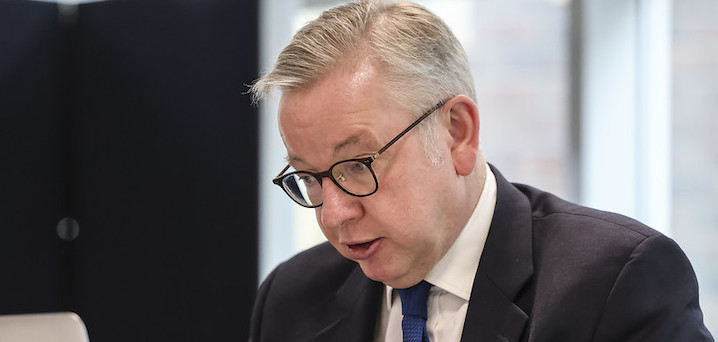
The 2022-23 settlement promises an extra £3.5bn. Michael Gove said the settlement represents a “real-terms increase from last year’s settlement and will make sure councils can improve vital frontline services”. He added it would also protect residents from “excessive council tax rises”. Below, the headline figures and a first commentary from Dan Bates.
- Total funding package of £53.9bn, up 6.9% (£3.5bn)
- Settlement funding assessment up 0.5% to £14.882bn
- Services grant of £882m
- Total increase grant funding of £2.1bn
- Social care support grant increased £636m to £2.346bn.
- Social care reform (fair pricing) adds £162m to funding
- New Homes Bonus shrinks from £662m to £554m
Dan Bates
Michael Gove’s first local government finance settlement has focussed on stability ahead of more fundamental reforms which are indicated for next spring.
The written statement, when finally released mid-afternoon, included only one-year allocations with no indication of numbers beyond this. A number of allocations were rolled over from previous years and the new services grant (£822m) which accounted for over half of the new money has the feel of stop-gap funding which will be redistributed in future years.
The focus on stability means that no authority shows has having a reduction in spending power so long as they raise council tax by the maximum allowed. The surprising addition of another year’s New Homes Bonus will come as a relief to some districts who might have been anticipating large funding reductions.
Although a one year rollover settlement lacks some of the certainty of funding that the sector has sought, there are clues as to Government’s focus in the promised spring funding review.
Social care received an additional £636m in funding, just over 40% of the £1.5bn funding. Although at the lower end of expectations, it is clear that funding reform will be a big part of considerations going forward.
For me the most interesting indication take-away from the allocations is the £822m services grant. Distributed via the SFA mechanism, this additional grant has not only provided stability but its distribution has meant that, for the first time in a decade, Councils in more deprived areas will receive larger spending power increases than those serving more prosperous areas. The first positive signal that the department is living up to its new name and will place “levelling up” at the centre of the new fair funding review next year.
Dan Bates is a finance specialist at LG Improve
Twitter @danbates_LGi
Room151’s Monthly Online Treasury Briefing
January 28 2022
Online
Public sector delegates – register here
Future funding, counties and deprived areas
Others quickly provided their views on the settlement. The Local Government Association worried it would leave councils needing to raise council tax by the maximum permissable next year. “This leaves them facing the tough choice about whether to increase council tax bills to bring in desperately needed funding at a time when they are acutely aware of the signifiant burden that could place on some households,” said Cllr James Jamieson, chair of the LGA.
He added the addtional social care funding is “good” but “will not go far enough”; Covid pressures mean “outbreak” funding will need to be extended to “tackle rising cases and meet a surge in demand for local contact tracing.”
A future funding arrangement weighs heavily on the sector, he added. He argued said the government should provide clarity on the funding reforms are coming. The government, he said, “needs to push ahead with the Fair Funding Review, including looking at both the data and the formulas used to distribute funding.”
22 March 2022
The Marriott Hotel, Leeds
LATIF North
Lead sponsor: CCLA
Qualifying finance officers can register free of charge here
Cllr Carl Less, finance spoeksperson for the County Councils Network, said despite good news in the settlement, counties are still managing a £700m funding gap next year. “Unless further funding is made available at the final settlement, our councils will need to make further difficult decisions to balance their budgets.”
The Institute for Fiscal Studies noted that councils serving deprived parts of the country “will see bigger increases in funding than those serving more affluent areas” in the settlement’s distribution. The most deprived tenth will see core spending power rise by 7.7% (4.9% in real terms) against 6.6% (3.8% real terms) for the more afflueny councils.
“This reflects that while more deprived councils are expected to generate less from council tax increase, this will be more than offset by the targeting of increases in grant funding at such councils,” an IFS statement said.
Consultation on the settlement will run until 13 January, 2022.
—————
FREE monthly newsletters
Subscribe to Room151 Newsletters
Room151 Linkedin Community
Join here
Monthly Online Treasury Briefing
Sign up here with a .gov.uk email address
Room151 Webinars
Visit the Room151 channel














